- Home
- Scott Turow
KC09 - Identical
KC09 - Identical Read online
Begin Reading
Table of Contents
Newsletters
Copyright Page
In accordance with the U.S. Copyright Act of 1976, the scanning, uploading, and electronic sharing of any part of this book without the permission of the publisher constitute unlawful piracy and theft of the author’s intellectual property. If you would like to use material from the book (other than for review purposes), prior written permission must be obtained by contacting the publisher at [email protected]. Thank you for your support of the author’s rights.
For Dan and Deb
I to the world am like a drop of water
That in the ocean seeks another drop,
Who, falling there to find his fellow forth,
Unseen, inquisitive, confounds himself.
William Shakespeare,
The Comedy of Errors
I.
1.
Paul—September 5, 1982
Many years from now, whenever he thinks back to Dita Kronon’s murder, Paul Gianis’s memories will always return to the start of the day. It is September 5, 1982, the Sunday of Labor Day weekend, a lush afternoon with high clouds lustrous as pearls. Zeus Kronon, Dita’s father, has opened the sloping grounds of his suburban mansion to hundreds of his fellow parishioners from St. Demetrios Greek Orthodox Church in the city for their annual celebration of the ecclesiastical New Year. Down the hill, in the grassy riverside meadow that serves as a parking lot, Paul arrives with his mother and his identical twin brother, Cass. The next few hours with both of them, Paul knows, will be an ordeal.
On the driver’s side, Cass is out of the old Datsun coupe instantly.
“I need to find Dita,” he says, referring to his girlfriend, Zeus’s daughter.
Their mother climbs from the passenger seat with Paul’s assistance, watching her other son sling his suit coat over his shoulder and bound up the hill.
“Theae mou,” she mutters in Greek and quickly makes the sign of the cross after invoking God in dismay.
“Mom,” Paul says, now that his brother is gone, “what are we doing here really?”
Lidia, their mother, condenses her thick eyebrows, as if she doesn’t understand.
“You refuse to come to this picnic every year,” he says, “because of how much Dad hates Zeus.”
“No more than I,” quietly answers Lidia, who rarely concedes priority in anything. Together, with Lidia hanging on to her son’s arm for support, Paul and she start up the gravel path toward Zeus’s vast white house with its low-pitched gables and Corinthian columns. “This picnic is for the church, not Zeus. I’ve missed many of our former neighbors, and I have not been face-to-face with Nouna Teri in months.”
“You talk to Teri every day.”
“Paulie mou,”—literally ‘My Paul,’—“I didn’t make you come here.”
“I had to, Mom. You’re up to something. Cass and I both know it.”
“Am I?” asks Lidia. “I didn’t realize that when you received your law degree, you also became a mind reader.”
“You’re going to make some kind of trouble about Dita.”
“Trouble?” Lidia snorts. At sixty-three, their mother has grown somewhat stout, but she retains a regal manner, a tall woman with fierce dark eyes and a wide spray of graying hair pushed back from her brow. “Dita makes enough trouble by herself. Even Teri admits that, and the girl is her niece. If Cass marries Dita, your father will never speak to him again.”
“Mom, that’s just old-country nonsense like believing in the evil eye. Cass and I aren’t going to carry on your crazy feud with Zeus. And we’re twenty-five years old. You have to let Cass make his own decisions.”
“Who says?” answers Lidia, adding a sudden chuckle and a squeeze of Paul’s bicep to lighten the mood. That is their mother’s idea of wit, laughing when she says something she means.
At the top of the hill, the picnic is a sensory barrage. The gums and spices, still smoking in the censers after a brief religious service, mingle with the aromas of four whole lambs roasting over oak, while the frenetic, high-pitched music of a bouzouki band lances the air to welcome the hundreds of guests crowding onto the lawn.
Teri, Zeus’s sister, their mother’s best friend since Lidia and Teri were both seven years old, awaits them with her scarecrow mop of dyed yellow hair. She embraces Paul and his mother. Zeus’s son, Hal, is beside Teri, greeting the guests. At forty, Hal is fat and awkward and overeager, the kind of person who always approaches you in the pathetic hapless manner of a slobbering dog. Even so, Paul retains a soft spot for Hal, whom Cass and he used to follow around like puppies twenty years ago, in the days before a quarrel about the lease on Paul’s father’s grocery divided their families. Like Paul, Hal seems willing to ignore all that. He hugs Paul’s mother, whom he still calls “Auntie Lidia,” and chats idly with Paul before Teri leads Lidia away. A covey of their friends awaits them in the deep shade of one of the many blue-and-white-striped tents pitched across the lawn. Reluctantly, Paul heads into this jumble of people from his childhood whose old-world ways and ponderous expectations he’s always longed to escape.
A few paces in, his girlfriend, Georgia Lazopoulos, catches sight of him and starts forward with her adoring grin. In her blue gingham sundress, Georgia is short and curvy and cutely dimpled—people always mention Sally Field. Although they have dated since their senior year in high school, their lips barely brush when they reach each other. Georgia is the daughter of Father Nik, St. D’s priest, and realizes she is under constant observation on occasions like this.
She has already prepared Paul a paper plate of lamb and pastitsio, both favorites, which he accepts with thanks, but he steps away from her for a second to look for Cass. Paul finally spies his twin amid a clutch of people from high school. Even at a hundred feet, Paul knows he can catch Cass’s eye, and when he does, he hitches his chin slightly so Cass is aware of their mother’s location. They have resolved to keep watch and intervene if Lidia comes near Dita. She is unlikely to approach Dita’s parents, to whom she has not spoken in years.
Privately, Paul shares most of his mother’s opinions about Dita, but he feels Cass’s fierce need for autonomy and has always treated his brother’s desires as synonymous with his own. Despite their parents’ furious opposition, Dita, with her caustic tongue and daring manner, seems to delight Cass far more than any prior woman.
Other people—normal people—don’t really understand what it is to grow up not fully knowing where you start and your brother ends. For Paul, humans fall into two classes: Cass, and everybody else. Even their mother, a titanic force who has always loomed over them with the strength and unbending will of a marble column, does not stand in the same realm of emotional proximity.
Therefore, it has been one of the most surprising challenges of Paul Gianis’s life that his brother and he began to become so different in college. Cass partied too much and openly resisted their parents. After graduation, Paul went on to law school, while Cass drifted until successfully applying to the Kindle County Police Academy, where he will start next week.
As Paul turns back to where he left Georgia, his legs tangle with someone behind him, and he is suddenly on the way down, arms helicoptering as he yelps, sending his plate flying. He ends up flat on his back, while the young woman he tripped on bends toward him, pinning his arms against the grass.
“Don’t move,” she says. “Give yourself a second to be sure you’re all right.”
It’s Sofia Michalis.
“Where have you been?” are the first words out of his mouth. He does not know if he means simply that he has not seen her in several years, or that the time has transformed her. Both are true. Sofia was always self-possessed, a smarty-pants, but
not the kind of girl you would have thought would end up so attractive. In high school, she was one of many young women the boys, with typical cruelty, referred to as ‘a Greek tragedy,’ meaning her nose is far too large for her face. But she always had that air. And a killer body. Now she knows she’s something special.
Laughing, he sits up to examine himself. There is a grass stain on the sleeve of his tan Brooks Brothers suit, but no pain anywhere. He accepts her hand to return to his feet, while several people who came close to help now turn away.
In answer to his question, Sofia tells Paul that for the last seven years, she has been in a combined college and med school program in Boston. She got her MD in June and began a residency here at U Hospital.
“In?” Paul asks.
“Surgery,” she answers.
“Jesus,” he says. He never would have imagined. “Does that mean I could have gotten free stitches, if I needed them?”
“My mother keeps telling me I should have let her teach me to sew.”
Sofia asks about him. He will be sworn in to the bar in two months and become a deputy prosecuting attorney in Kindle County in Raymond Horgan’s office.
“And what about the rest of it?” Sofia asks. “Still going with Georgia?”
“Still going with Georgia,” he answers. Her two small front teeth appear over her skinny lower lip and that fine set of honkers seems to perk up somehow. He recognizes what she’s thinking: When are you going to figure it out? “She’s here somewhere,” he says and gestures widely, as if he did not know that Georgia is bound to have stayed close, almost as if he otherwise might get away.
“I’ll have to find her,” Sofia says. “And say hello.”
“You should,” he says, feeling that Georgia has somehow thwarted the momentum of their conversation. Sofia parts with a quick wave and he resists the temptation to let his eye follow her. But the impact of her presence lingers. Sofia, he senses, has become one of those people he has longed to be, able to make herself felt in the world. It is a jarring sight when he finally glances back a second later to see Sofia with Georgia, who holds no similar ambitions. At Father Nik’s urging, Georgia skipped college, and is already a senior teller at a local bank. Paul loves Georgia. He will always love Georgia. But he is not sure he wants to marry her, which is what she and her family have long expected. That is his problem. Life with Georgia would be good, but not necessarily interesting.
Caught up with these thoughts, Paul realizes that he has lost track of their mother, and when he finally spots her, he is alarmed to see her engaged with the host. But Lidia is considering Zeus with an unyielding expression. Dark and still improbably handsome at the age of sixty-six, Zeus with his rushing silver hair is turned out in a white suit, doing his best to appear jolly in the face of Lidia’s coolness. Paul would have thought that Zeus is too obviously stuck on himself to succeed in politics, but he became the Republican candidate for governor, and is neck and neck in the general election race with barely two months to go. If Zeus wins, he will presumably leave his vast business, which owns shopping centers across the nation, in the hands of Hal, who is virtually certain to run it into the ground.
In the meantime, Paul notices Zeus’s beautiful daughter headed toward him. Dita glides up and plants full on Paul’s mouth a humid kiss, in which the ether of alcohol lingers. Whenever he sees Dita, she seems to be smashed. It takes Paul an instant to understand that she is pretending she can’t tell the twins apart—most people still cannot—and he eases her away.
“Is that you, Paul? Lucky for me you didn’t play along. Would Cass be jealous or do you two share everything?” Raven-haired and statuesque, with full, well-shaped features and striking dark eyes, Dita laughs and draws her breasts against his arm, forcing him to take another step back.
Because of antics like this, Paul tries hard to avoid Dita, even though he knows intuitively that is exactly what she wants, to separate him from Cass.
“Dita, I know you think you’re funny, but I wouldn’t be hanging by the phone waiting for your guest shot on Carson.”
“Oh, Paul,” she says, “you’re totally uptight. If somebody shoved a lump of coal up your ass, it would turn into a diamond.” Having plainly triumphed in this impromptu round of the Dozens, Dita pauses for a measuring look. “Why is everybody in your house against me?”
“We’re not against you, Dita. We’re for Cass.”
“That’s right. Cass needs a girl like Georgia. Bor-ring.”
The pain of hearing someone speak so callously about Georgia is surprisingly sharp, and he has to suppress the impulse Dita frequently inspires to slap his hand over her mouth. Dita is smart. That is another thing that makes her so dangerous. He turns away, but Dita cannot resist a final shot.
“Really,” she says, “I think I would have dumped Cass a long time ago, if I didn’t know it would give the rest of you such a thrill.”
Over the years, when Paul revisits this day that will change his family’s life forever, Dita’s thrashing unhappiness with herself will grow plain to him across the distance of time. But in the moment, he can feel only the peril to his twin that Dita poses, and his painful inability to save Cass from it. Paul walks off, while the thought comes to him with the force and clarity of a trumpet blast: He despises that woman.
2.
Pardon and Parole—January 8, 2008
Evon Miller, fifty, senior vice-president for security at ZP Real Estate Investment Trust, ran with the uncommon speed of a former athlete through the basement of the State Building Annex, not knowing where she was going or why she was here. Short and strongly built, Evon unexpectedly made out the number of the conference room she was seeking, and jerked to a halt. Within a plastic holder beside the door, a misprinted placard read PARDN AND PAROLE BOARD HEARING. Inside the conference room, she found her boss, Hal Kronon, CEO of ZP, whose urgent e-mail had summoned her. He was speaking with his personal lawyer, Mel Tooley, and another man in a suit she didn’t know.
Evon had spent twenty years as an FBI special agent before taking this job, and she had learned that the power of the state, frequently spoken about as if it were a dread disease, was often most notable for the utter lack of majesty with which it was exercised. The Pardon and Parole Commission’s monthly deliberations about the liberty of several dozen humans were going to be conducted in this low-ceilinged windowless room from metal folding chairs placed at two card tables. Behind the seats, the great seal of the state, thirty inches across and all plastic, hung slightly askew on the streaked wall. A lectern with a microphone was centered between the commissioners and two more card tables reserved for the participants, the state and whoever would speak for the prisoner. The hearing, which the card at the door said would commence at 2:00, had apparently been delayed.
Evon’s boss, dark and burly, with his shirt gathered over the waist of his bespoke suit and his necktie askew, finally saw her and drew her toward a corner of the room. On the way, she asked why he was here. His message had offered no explanation.
“I’m trying to keep Cass Gianis in prison,” he said. Evon knew next to nothing about the murder of Hal’s sister, Dita, in September 1982. The case was long past being news by the time she’d moved to Kindle County fifteen years ago, and Hal preferred not to discuss it. Her knowledge was limited to what had been in the papers recently, that Cass Gianis, the identical twin of Paul Gianis, a state senator now running for mayor, had pled guilty to killing Dita, his girlfriend at the time. “That’s not what I need first.”
“What is?”
“It’s YourHouse,” he whispered. Hal had been in negotiations for months to buy YourHouse, one of the nation’s largest builders of planned communities, for several hundred million dollars. With the downtick in prices for single-family homes, he believed he could bargain hard and diversify ZP, as he’d been advised to do for years. “We missed something in our due diligence. In Indianapolis. Sounds like there may be a brownfield on part of the site. We need environmental invest
igators. ASAP.”
Evon was not even sure there was such a thing. Worse, knowing Hal, she was wary of chasing phantoms.
“Where did this come from?” she asked, meaning the information.
Hal kept his voice low, his lips barely moving.
“Tim shadowed Dykstra and the rest of the YourHouse crew, after they flew in yesterday.”
“Jesus, Hal.” ZP had kept Tim Brodie, an elderly former homicide detective, on an annual retainer for decades to do occasional work as a private investigator for Hal. Evon had little use for private investigators, most of whom were wannabes and used-to-bes who didn’t know where the lines were and could get the company in trouble. Having Brodie spy on his business adversaries was typical of Hal’s impulsive and risky stunts.
“Get somebody on this,” he directed Evon, “but don’t go far. I may need your help here.”
As a boss, Hal Kronon, who had run ZP on his own since the death of his father, Zeus, twenty years ago, seemed to exist in a state of constant agitation. He could be by turns imperial, outraged or pleading, and always loud and opinionated. In every mood Hal required instant gratification from his employees. Evon was often baffled, therefore, by how fond she had become of him in the three years she’d been at ZP. For one thing, he had been astoundingly generous, making her far richer than a girl from Kaskia, Colorado, ever would have imagined possible. But mostly she liked Hal because he was so abject when he needed her help and so thoroughly appreciative afterward. Hal was one of those men who required plenty of women to take care of him, especially now that his mother, Hermione, was gone. There was Hal’s wife, Mina, funny and bossy, and pudgy like her husband, and ancient Aunt Teri, his father’s sister, who scared everyone a little bit. At work, Evon had become one of Hal’s principal confidants, frequently nodding for hours, and gently attempting to save him from himself.

 Testimony
Testimony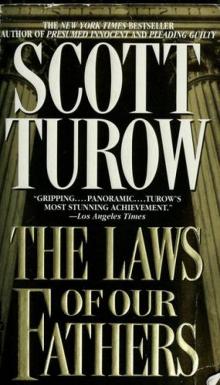 The Laws of Our Fathers
The Laws of Our Fathers Ordinary Heroes
Ordinary Heroes Personal Injuries
Personal Injuries Limitations
Limitations Identical
Identical Pleading Guilty
Pleading Guilty Presumed Innocent
Presumed Innocent Reversible Errors
Reversible Errors One L: The Turbulent True Story of a First Year at Harvard Law School
One L: The Turbulent True Story of a First Year at Harvard Law School Ultimate Punishment
Ultimate Punishment The Burden of Proof
The Burden of Proof Ordinary Heroes (2005)
Ordinary Heroes (2005)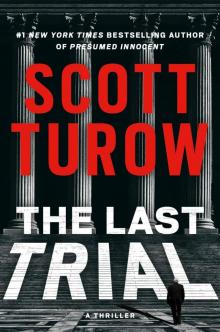 The Last Trial
The Last Trial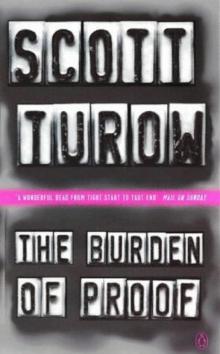 The Burden of Proof kc-2
The Burden of Proof kc-2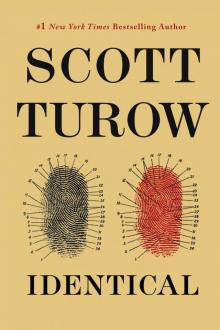 KC09 - Identical
KC09 - Identical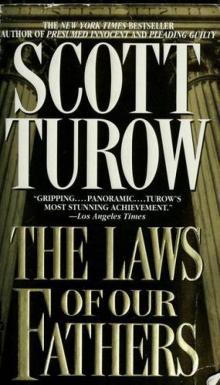 The Laws of our Fathers kc-4
The Laws of our Fathers kc-4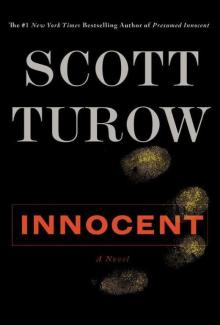 Innocent kc-8
Innocent kc-8 One L
One L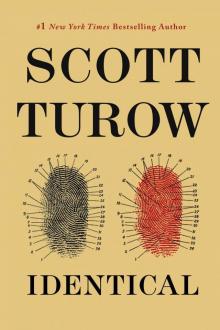 Identical kc-9
Identical kc-9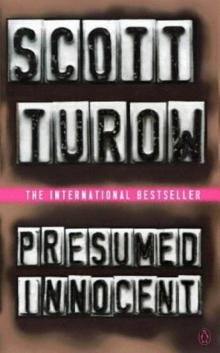 Presumed innocent kc-1
Presumed innocent kc-1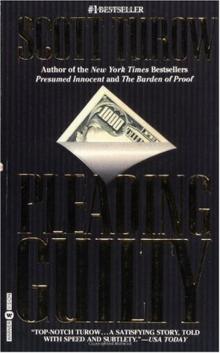 Pleading Guilty kc-3
Pleading Guilty kc-3 One L (1977)
One L (1977)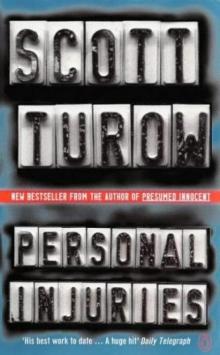 Personal injuries kc-5
Personal injuries kc-5